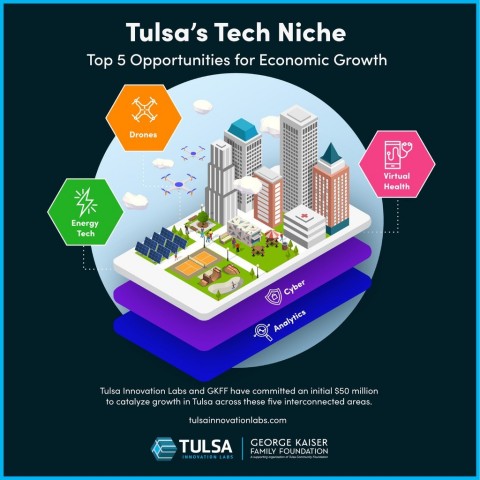TULSA, Okla.--(BUSINESS WIRE)--Tulsa Innovation Labs (TIL), the new technology-led economic and workforce development organization pioneered by George Kaiser Family Foundation (GKFF) released its report identifying the city’s five most promising tech opportunities:
- Virtual Health
- Energy Tech
- Drones
- Cyber
- Analytics
The report evaluated multiple tech industries to identify the highest growth and most contestable areas for Tulsa. As part of the study, TIL engaged over 100 stakeholders, and their perspectives were invaluable as TIL looks to drive its work through industry and community partnerships. McKinsey & Company, the global management consultancy, provided analytical support to the study.
TIL launched in early 2020 and is working to establish Tulsa’s tech niche by creating new programs and projects to support local talent, startups, and academic innovation aligned to the five tech clusters above. Through its work, TIL aspires to create the nation’s most inclusive tech community in Tulsa.
“We’re excited to work with forward-thinking partners across sectors as we transform Tulsa into a tech hub and leader in the future of work,” said Nicholas Lalla, co-founder and managing director of TIL. “The playbook for action we created will enable us to catalyze growth in five tech clusters and provide new opportunities to Tulsans. Especially today, as we struggle to adapt to market disruptions and worker displacements caused by the pandemic, we believe now is the time to think about the future and build an equitable and diversified economy for Tulsa.”
TIL is funded and supported by GKFF, a Tulsa-based charitable organization.
Ken Levit, executive director of GKFF, said: “GKFF’s core focus is early intervention in the cycle of poverty. But we know that to provide long-term opportunities for Tulsa’s families, we need to invest in our local economy and prepare Tulsa for the jobs of the future. That’s why we’re excited about supporting Tulsa Innovation Labs. TIL is going to be instrumental in creating a thriving and inclusive economy that creates new opportunities for Tulsans.”
Two programs sit within the TIL strategy already: a doctoral fellowship in cyber and a coding academy.
TIL is partnering with the University of Tulsa to bring a leading cyber venture creation company, Team8, to Tulsa. Founded in Tel Aviv, with a large New York City office, Team8 is collaborating with 10 PhD students each year to create cyber-related companies from their research projects. The fellowship provides incentives for participants to stay in Tulsa upon graduation and pursue their entrepreneurial ambitions.
“The University of Tulsa is known for its excellence in cyber,” says Nadav Zafrif, founder and chief executive officer of Team8. “Taking academic research and leveraging that to create new businesses will feed Tulsa’s burgeoning innovation economy. This type of partnership, between the university, Tulsa Innovation Labs, and Team8 represents a new model for commercializing innovation and spurring economic growth.”
The Holberton School, a software engineering academy based in San Francisco, also launched its third U.S. campus in Tulsa in January, and is key to TIL’s efforts to building an inclusive tech community in Tulsa. At scale, Holberton will graduate 500 software engineers each year.
"Having diverse backgrounds and experiences in the workplace makes for better business decisions, more responsive products, and a more inclusive ecosystem,” said Libby Wuller, executive director of Holberton School, Tulsa. “As Tulsa strives to build a tech-enabled economy, we must do so with a diverse workforce! At Holberton, our deferred tuition model and living assistance program aim to create pathways to the software engineering profession regardless of an individual’s circumstances."
New programmatic and project opportunities in phase one of TIL’s multi-phase work will be announced later this year. TIL plans on prioritizing its virtual health and workforce activities in cyber and analytics in phase one.
While Oklahoma has leaned on oil and gas as an economic staple, in recent years, other innovations have come to the surface that are diversifying Tulsa’s economy. Entrepreneurship has exploded with multiple co-working spaces, incubators, and successful startups throughout Tulsa. The city is also home to a thriving arts scene.
“Tulsa has made incredible strides reinventing its economy around remote work, arts and culture, and quality of place with one of the greatest open spaces in modern memory, Gathering Place. Now, the region is taking the next crucial step in building its innovative and entrepreneurial startup economy with the launch of Tulsa Innovation Labs,” said urbanist and author Richard Florida. “This cutting-edge new initiative will help attract global talent, retain local talent, and power the economy of the future.”
About Tulsa Innovation Labs
Recognizing that the jobs of the future are rooted in a thriving innovation economy, the George Kaiser Family Foundation pioneered Tulsa Innovation Labs to develop a city-wide strategy that positions Tulsa as a tech hub and leader in the future of work. Through a diverse coalition of public and private partners, TIL is creating economic development programs that seek to make Tulsa the nation’s most inclusive tech community. For more information, visit: www.tulsainnovationlabs.com.

